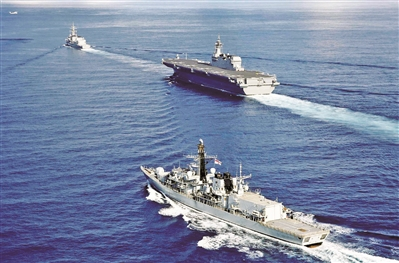By Wen Weiru

JMSDF and the UK navy hold joint military exercise.
Foreign media reported that Japanese Prime Minister Fumio Kishida visited Asian and European countries from April 29 to May 6. Tokyo's purposes and intentions for making these visits are worth close attention because they have assumed new implications given the complexity and sensitivity of the current international situation.
Fumio Kishida's intensive foreign trip was allegedly purported to realize a so-called free and open Indo-Pacific initiative and to intensify cooperation with those countries on regional issues such as the "Korean Peninsula".
No matter how fancy and plenty the Japanese government tried to make the topics sound, their prime minister's Asia-and-Europe trip actually had clear goals.
One is to establish a favorable image for Japan and gather power for revising the Peace Constitution. During his visits to Asia and Europe, Kishida held talks with the leaders of relevant countries on regional affairs and hotspot issues, demonstrating Japan's attitude and resolve to engage in international affairs to the global community, and trying to increase his exposure and portray himself as an internationally active leader at home. Kishida had said that he would continue to push the revision of Japan's Constitution previously, and his attitude on the issue is said to affect the public attitude of the Japanese people.
The second goal is pitching for the US and luring ASEAN countries to pick sides in the major-country competition. At present, the US and NATO are having an all-round strategic wrestling against Russia and continuously expanding their circle of friends to form a besiegement of it. Kishida has obviously picked the countries he visited carefully – Indonesia is the rotating chair of the G20, Thailand holds the rotating chair of the APEC forum, and Italy and Britain are members of the G7, all of which have a say over regional affairs to varying degrees. During the visits, the Japanese leader was peddling America’s "Indo-Pacific strategy" by promising to make more investments and increasing military aid, and tried to lure his hosts to support the "Strategic Framework for the Indo-Pacific" and play a part in it when discussing international issues.
The third goal is tightening the economic and security ties with ASEAN for long-term considerations. Seeing ASEAN as a key arena to scramble to get more say in the Asian-Pacific region, Japan has taken the initiative to improve its relations with ASEAN countries in recent years. In the economic and trade sector, Tokyo sees Southeast Asia as the destination of industrial transfer and investment and an emerging consumer market; in security, it regards Southeast Asia as an entry point to meddle in the South China Sea and a market of its weapons and equipment exporting. It is reported that during his visit to Indonesia, Kishida decided to provide an additional JPY 70 billion loans (about USD 533 million) for the country's port construction, as well as patrol vessels to enhance its maritime security capability. When in Vietnam, Kishida promised to carry out defense cooperation with Hanoi and aid its military development.
It must be pointed out that Southeast Asian countries are only too aware of what Japan is up to and have generally kept a sober mind. Thailand's ex-finance minister Tirachai posted on his social media account that Thailand should not embroil itself in the major power competition despite the olive branches from the US and Japan. Vietnamese Prime Minister Pham Minh Chinh presented to his visiting counterpart a calligraphic work that read "Sincere, Affection, Trust", which are the exact words that Kishida should bear in mind when engaging in regional or international affairs. Only well-meant moves could bear good fruits. Those who fan flams and form gangs will only backfire themselves.













